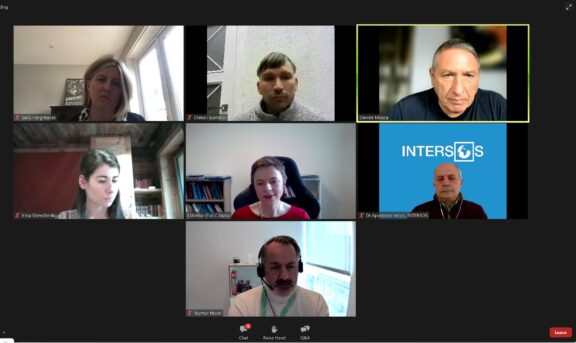Our webinar about the humanitarian crisis in Ukraine took place on 30 March 2022.
Find the summary including all references, here: Summary webinar_Ukraine_Lancet Mig_03-05-22

Organisations must work together to solve the pressing health and care needs. (Photo: Freepik)
Webinar summary: The war in Ukraine and the complex health emergencies facing people on the move
Background
After the beginning of conflict in Ukraine on March 24th, 2022, approximately 4 million people including 100, 000 non- Ukrainian nationals were forcibly displaced and 6.5 million have been internally displaced (UNHCR, 2022). With the destroyed healthcare infrastructure, there is a restricted access to medical services, including treatment of injuries and chronic diseases. People with disabilities (deaf, blind, dementia, intellectual disabilities, etc.) are one of the most vulnerable categories, in addition to children, women and elderly. Along with the ongoing conflict, low awareness about dementia and stigma attached to it in Ukrainian context poses a serious barrier. Furthermore, Ukraine has a history of low vaccination coverage (Khetsuriani et al., 2017; Smiianov et al., 2019; Tsagkaris et al., 2022), including child vaccinations such as measles, mumps, rubella, diphtheria, polio, tetanus, pertussis, TB, etc., in addition to covid-19 vaccines. Moreover, there is a severe psychological trauma, especially among migrant women who have migrated with divided families. Half of their families are left behind, that is, the men who are left to fight in the war.
Irina Shevchenko
“Support is needed. We are willing to cooperate within and outside Ukraine.”
- There are two types of challenges for people of Ukraine: for those who stayed and those who fled the country. Those who stayed need urgent evacuation from the dangerous territories, basic supplies of medicines, food, and cash, along with medical and psychosocial support. This is especially difficult for people with dementia due to low capacity of dementia services in Ukraine. The general state of people with dementia worsened a lot because of the constant noise of the air strikes and necessity to hide in bomb shelters. And those who fled the country with relatives suffering from dementia are face many difficulties. There is no information about which countries are dementia friendly and the lack of information concerning available support in other countries is an important barrier.
- Within Ukraine, the Nezabutni Charitable Foundation is providing support with free consultation with psychiatrists, medications delivery with the help volunteers, delivery of medications from abroad and helps with evacuation. Outside Ukraine, they cooperate with local offices and provides support for refugees by country through Nezabutni United website.
- There is a great need for access to online services, psychosocial support, and development of ‘advice cards’ for caregivers, for humanitarian agencies and people living with dementia.
Dr. Ela Czapka
“This humanitarian crisis will change the whole society; research will be needed to know how it will influence and transform the society. Government should collaborate with people and NGOs working on the ground to support the refugees. Crisis gives new possibilities.”
- Poland has always been resistant to refugees, but with Ukrainian crisis, the Polish people are showing solidarity. Around 2.2 million people have taken hostage and Poland has no prior experience in managing huge migration crisis like this.
- People who have fled the war zone have serious physical and mental conditions such as gynecological, dehydration, diarrhea, psychological trauma, oncological, chronic diseases, etc.
- Challenges lies with insufficient number of psychologists and psychiatrists specializing in PTSD and war trauma, especially child psychiatrists, language barriers and lack of interpreter essentials for trauma intervention, support and the first aid of people with chronic health problems and needs, shortage of doctors in the refugee centers, and healthcare services focusing on emergencies not for prevention, in addition to gap regarding the vaccination (for common diseases and covid-19).
- The Special Act is enforced that grants the right to medical benefits, reimbursement of drugs and the supply of medical devices to Ukrainian citizens who came to Poland due to the aggression of Russia, on the same terms as those insured in Poland are entitled to.
- Response in Poland ranges from hospital admissions, medical and reception points, tele appointments in Ukrainian, availability of hotline number 24/7 to consider using the covid-19 vaccination centers to perform all types of vaccinations to Ukrainian refugees.

Screenshot of webinar speakers
Dr. Apostolos Veizis
“To open up your arms and hearts to refugees is not enough. Ukrainian refugees need to be included in the societies. Women who have lost their house, their husband, may not go back to Ukraine. They will be staying in the new country. But I am afraid that the answer to the refugee situation will be the same as in Greece: the creation of camps, and they will be staying there for a long time. Cultural mediators are lacking. We need strategies for integration. History is looking at us.”
- INTERSOS team has been deployed since the beginning of the conflict at Poland, Moldova and Ukraine and priorities health and protection needs of the refugees. Health needs include primary and secondary health services and supporting the local healthcare system whereas protection needs include the legal, physical, and psychological protection of the most vulnerable people, such as women and children.
- Demography of the refugees: 88.4% females and 1.6% males; 95.3% have Ukrainian nationality, while 1.4% are from Uzbekistan, 0.9% from Tajikistan and 0.5% from Uganda, Ghana, Georgia, and Russia. Many of these refuges have conditions such as cancer, mental disabilities, URTI, skin conditions, chronic diseases. Covid-19 is a particular challenge.
- Health response included supporting the local health systems to ensure access to lifesaving, primary and secondary medical services, and mobile clinics to reach remote locations with the highest turnout of IDPs and with a scarcity of humanitarian presence, referring to identified local health centers.
- Protection response included psychosocial support and provision of information, community-based protection to people with specific needs, child protection cases, survivors of gender-based violence, and protection activities are integrated with health activities to provide holistic and comprehensive approach to populations.
Ioannis Vardakastanis
“Disability is a crisis within the crisis. Let’s make the invisible visible in the crisis and let’s not forget who are usually forgotten.”
- In Ukraine, there are over 2.7 million people living with disability and many of them have fled the country. In institutions for persons with disabilities there is lack of food, medication, and supportive services and in neighboring countries there are gaps with transportation, shelter, medication, assisting technology and supportive services.
- All persons with disabilities should be provided with a disability-inclusive environment. The recommendations are to include organizations of Persons with Disabilities (PwD) in humanitarian response to provide guidance and expertise, disaggregation of data for PwD, provide immediate access to PwD to food, shelter, medication, supportive services according to their needs, and develop integration plans. Also, ensure support of people on ground who are supporting PwD.
Oleksii Sukhovii
“Even very strong people need support in humanitarian crisis. The human rights violation going on in Ukraine and there must be a strong reaction from Europe and the World.”
- Ukraine has a long history of various profound traumatic events and during the last 8 years, millions of Ukrainians have been internally and externally displaced. This has also hardened the people and made them more resilient to the challenges of hybrid warfare.
- In Ukraine, before the start of large-scale hostilities more than 90 hospitals provided inpatient psychiatric care for 200-300 000 people yearly, among which the lion’s share were specialized psychiatric hospital. Also, more than 40 000 people with mental disorders stayed for a long time in 280 psychoneurological facilities and orphanages. Over 1.5 million people were diagnosed with mental health disorders and received outpatient psychiatric care in more than 600 facilities. But even more people were not diagnosed or were misdiagnosed and didn’t receive mental health care of adequate quality. Currently, many facilities are located in the temporarily occupied territories, others are being evacuated to the western or central regions of Ukraine, or even abroad (Quirke et al., 2022).
- Need of continuous reforms in the mental health system and a need to integrate: (1) psychiatric wards in the general hospitals, (2) mental health into primary healthcare, (3) wide range of mental health services in the communities. There is a need for more human- and recovery-oriented, evidence-based mental health services in Ukraine.
- Further readings: (Kemp et al., 2022; Patel et al., 2021; Quirke et al., 2020)
Teymur Noori
“Because large masses of people are on the move, government cannot work alone, everyone should support in every possible way. Link people to care and treatment as soon as possible and provide protection against gender-based violence. There is a need of intercultural mediators.”
- ECDC has prepared an operational document (ECDC, 8 March, 2022) that focuses on the infectious disease vulnerabilities of those fleeing from Ukraine and the associated requirements for infection prevention and control. Public health authorities should increase awareness among the community health care providers regarding the need to ensure access to services and continuity of care, ensure integrated approach to healthcare.
- The document further highlights the vaccination priority. Ensuring continuity of routine vaccinations and addressing gaps in prior vaccination histories is an essential element. Ensuring vaccination coverage against poliomyelitis, measles, mumps, rubella, diphtheria, tetanus, pertussis, Hib and COVID-19 should be a priority. Vaccination acceptance also needs to be assessed and addressed among those fleeing Ukraine.
- Surveillance systems should be enhanced by increasing awareness among health professionals taking care of displaced people. Syndromic surveillance should be considered for those accommodation and reception centers. Health and communication activities should follow the standard principles.
- ECDC has produced a guidance document (ECDC, 18 March, 2022. ) on the prevention and control of covid-19 in the reception centers. Factors that contribute to increased risk of COVID-19 outbreaks include low vaccination coverage, limited access to healthcare, including testing, and overcrowding. Vaccination for COVID-19 remains the most essential intervention (low vaccination uptake in Ukraine).
- Ongoing work includes:
- Health assessment tool: A tool to support front-line health care workers to guide individual health assessment and will cover covid-19, vaccine preventable diseases (VPDs), HIV and TB, non-communicable diseases, mental health and psychosocial support, sexual and reproductive health, and gender-based violence, child health, nutrition, and persons with disabilities.
- Updating ECDC syndromic surveillance tool from 2016 (ECDC, 2016): To ensure early detection of outbreak-prone diseases and VPDs to inform vaccination efforts in settings such as temporary reception centers with shorter length of stay, temporary reception centers with longer length of stay (>1 week) and routine/ enhanced surveillance in the community (once dispersed into the community).
- ECDC provides a guidance tool (ECDC, 2018) on screening and vaccination of for infectious diseases in newly arrived migrants, 2018, that provides guidance for TB, HIV, Hepatitis, Intestinal parasites; and routine vaccinations such as measles, mumps, rubella, Hib, diphtheria, tetanus, pertussis, and polio.


